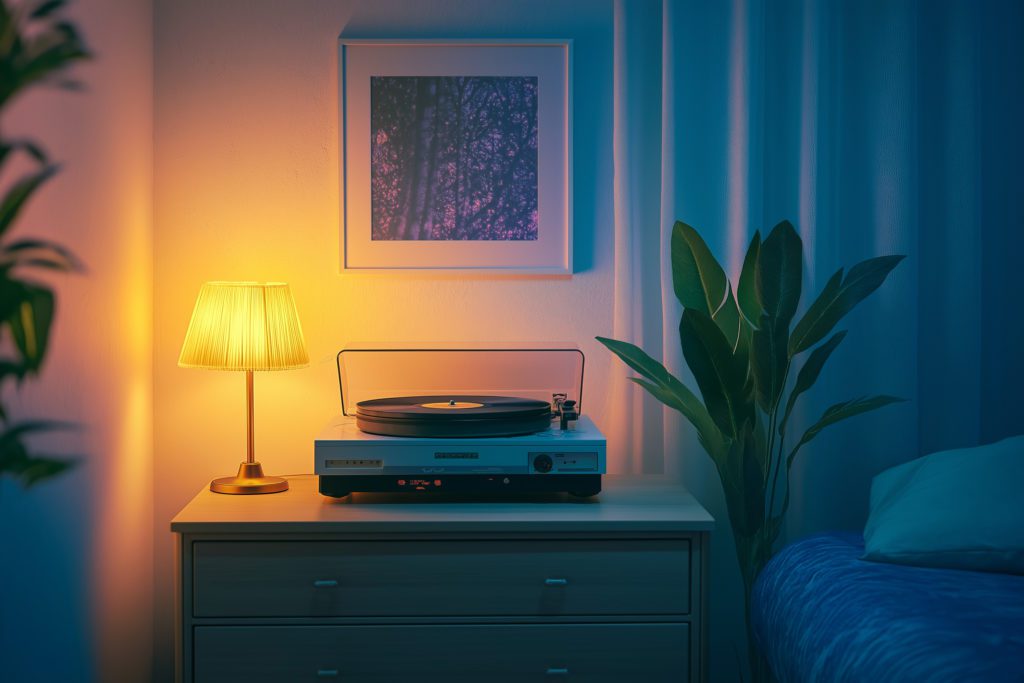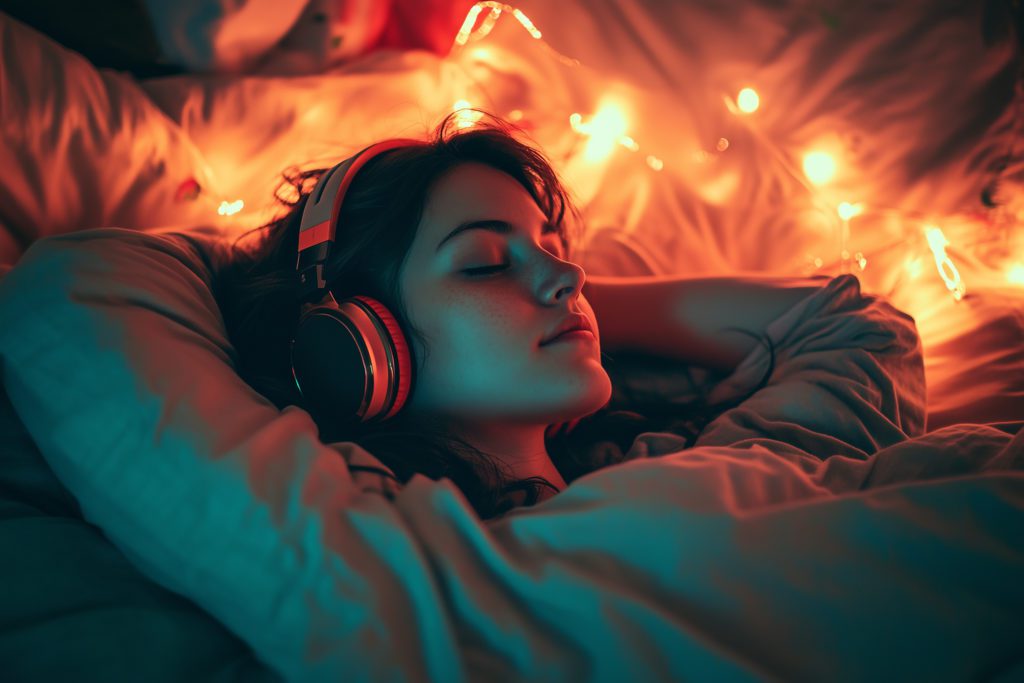
The Best Binaural Beats for Deep Sleep: A Guide to Frequencies
Discover the best binaural beats for deep sleep in our guide. Explore frequencies that enhance rest, transition to sleep, and improve relaxation

Do you find yourself tossing and turning at night, unable to sleep? Some people like to meditate before bed to help them relax and enjoy deeper sleep, but others might benefit from using binaural beats. Binaural beats are stimuli that can be set to a specific rhythm and then generated to get an audio frequency that can synchronize with our brainwaves. But with so many binaural beats, which ones are the best for you to use to enjoy deeper sleep?
In this article, we will explore what binaural beats are, how they can help you achieve deep sleep, and what frequencies are best for your rest. We’ll even cover some of the ways you can use these before bed and some considerations to keep in mind while using them. Are you ready? Let’s first explore why these beats are so integral to achieving deep sleep.
What Are Binaural Beats
Binaural beats are frequencies we can listen to that synchronize with our brain waves, encouraging us to enjoy more profound rest, focus, and more. There are several different types of binaural beats that you might encounter, including the following:
- Delta (0.5 – 4 Hz)
- Theta (4 – 7 Hz)
- Alpha (7 – 13 Hz)
- Beta (13 – 30 Hz)
- Gamma (30 – 50 Hz)
Each of these binaural beats has a unique impact on our body, typically affecting our EEG rhythms and other aspects of our health. What happens is that the binaural beat will interact with your brain cells or neurons, and it will help them oscillate at a specific frequency, like the binaural beat. It’s truly fascinating how powerful these frequencies can be!
How Do Binaural Beats Encourage Deep Sleep?
Binaural beats are extraordinarily impactful when it comes to our deep sleep. Just as binaural beats can help us encourage more focus and concentration, we can use specific frequencies to promote deeper sleep. However, there are particular types of binaural beats that you’ll have to use, and they will have a distinct impact on your brain cells or neurons.
Regardless of which type of binaural beat you use that is appropriate for sleep, you’ll experience the same impact. When using delta binaural beats, for example, you are actually stimulating the delta brainwave, which is associated with deep sleep. According to one study, using delta binaural beats can help you trigger deep sleep even faster than if you didn’t use binaural beats at all!
Therefore, as you can see, listening to specific binaural beats can help you encourage your brain to promote specific brainwave activity. But what binaural beats are best? That’s a topic that we will explore next, so you can plan ahead and try this next time you lie down to sleep.
The Best Binaural Beats to Encourage Deep Sleep
The best binaural beats for sleep include delta waves and theta waves, which are associated with the deepest levels of sleep and REM sleep. However, other types of binaural beats, like alpha binaural beats, have been used to help alleviate anxiety and help students improve their sleep quality over time (Source: Journal of Sleep Sciences).
Let’s look at delta and theta binaural beats in further depth so you understand how they impact your brain and what they can do for your sleep.
Delta Binaural Beats: The Secret to Deep Sleep
Delta binaural beats are the best if you want to encourage deep sleep, as they will trigger the promotion of delta brainwaves within your brain. Several studies have shown how effective these beats are for those who may suffer from sleep deprivation, even those who may face mental health challenges, too!
Students who used binaural beats in the delta wave frequency range found that, after two weeks, they saw an improvement in their sleep quality, awakenings overnight, duration of sleep, and even in their overall feelings of anxiety or anger (Source: Digital Health). One of the biggest indicators of how this type of binaural beat impacts deep sleep was in how students enjoyed longer sleep duration, specifically deep sleep.
Theta Waves: Your Key to Better Transitions to Deep Sleep
The second-best binaural beat to choose for deep sleep is theta waves, which are well known for their ability to help you transition to deep sleep more easily. Theta binaural beats are associated with triggering theta brainwaves, which are essential for your memory, relaxation, and even daydreaming. However, more related to your sleep, it can also help you make the transition from being awake to being asleep.
If you want to experience deep sleep, you will need to experience theta brainwaves, and by listening to this binaural beat, you can do just that! So, even just listening to theta binaural beats for a few minutes can be an excellent way for you to encourage better sleep, relaxation, and, ultimately, deep sleep, which your body needs for proper rest and recovery.
How to Use Binaural Beats for Deep Sleep: Important Tips and Advice
If you’re interested in using binaural beats, you can give it a try for a few minutes tonight to see how you react to them. Be sure to make yourself comfortable, preferably lying down on your bed, and don’t forget to grab a good pair of headphones! Even if you just listen for a few minutes at a time to start, it can provide you with benefits. One study showed that even 10 minutes of theta binaural beats activated the theta brainwaves within your brain (Source: IEEE).
To get the best results, eliminate your distractions, close your eyes, and let yourself sink into the sound of the binaural beats. It’s best to set a timer for your desired amount of time and start with only 5-10 minutes at first. Don’t listen at a volume that is too high. If you have epilepsy or seizures, it’s best to talk to your doctor before you start using binaural beats, as some might impact you differently than others.
Are You Going to Give Binaural Beats a Try?
With so many benefits, binaural beats are an excellent way for you to encourage deep sleep on a budget. All you need is good-quality audio, some headphones, and a few minutes to yourself. Give it a try tonight before you go to bed to see how it works!
FAQ
Can binaural beats be used alongside other sleep aids or relaxation techniques?
Yes, binaural beats can work well with relaxation methods like meditation, deep breathing, progressive muscle relaxation, or aromatherapy. Combining these techniques can enhance their calming effects, making it easier to unwind and achieve a restful state for better sleep.
Are there any side effects or risks associated with using binaural beats for sleep?
Binaural beats are safe for most people, but individuals with neurological conditions like epilepsy should consult a healthcare provider before use. Prolonged listening at high volumes can cause discomfort. It's essential to listen at a comfortable level and avoid overuse.
Do I need special equipment to listen to binaural beats effectively?
Yes, a good pair of stereo headphones are necessary to fully experience binaural beats. The technology relies on delivering slightly different frequencies to each ear, creating the perception of a "beat" within the brain. Without headphones, the effect is diminished, reducing its effectiveness.
Which frequencies are best for deep sleep?
Delta waves (0.5–4 Hz) are best for deep, restorative sleep, fostering physical recovery and emotional health. Theta waves (4–7 Hz) are ideal for the transition from wakefulness to sleep, promoting relaxation. Combining these can improve sleep onset, duration, and quality.
Can I use binaural beats during naps, or are they only effective for nighttime sleep?
Binaural beats are effective for both naps and nighttime sleep. They help relax the mind, lower stress, and facilitate quicker transitions into sleep states. Short naps with theta waves or longer naps using delta waves can enhance rest and mental clarity.
Can I create my own binaural beats, or should I use professionally produced tracks?
You can create binaural beats using audio software, but professionally produced tracks are crafted to target precise brainwave frequencies for relaxation and sleep. These tracks often include soothing soundscapes to enhance their effectiveness, saving time and effort.
How do binaural beats compare to other auditory sleep aids, like white noise or nature sounds?
Binaural beats directly influence brainwave patterns to align with sleep states, enhancing relaxation and promoting sleep. White noise or nature sounds mask environmental noise to create a calming environment but don't actively guide brainwave activity like binaural beats.

Written by
Marie Soukup
Marie Soukup is a seasoned copywriter, editor, and Integrative Nutrition Health Coach with a certificate from the Institute of Integrative Nutrition (IIN). With years of experience working with brands across diverse industries, Marie is passionate about holistic health and crafting compelling content.
Download Pillow
Get help
Press & News
Legal
Connect
X (Twitter)
Company
Copyright © Neybox Digital Ltd.



